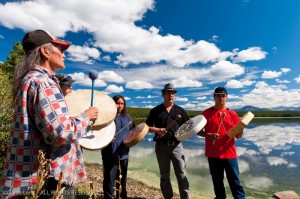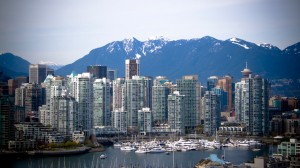 In Larry Pynn’s 2014 article, “Tsilhqot’in set to declare site of New Prosperity mine a tribal park”, the debate between Taesko, a Canadian mining company, and Tsilhqot’in First Nations is described. Taesko has plans to build a $1.1 billion copper-gold project at Fish Lake, while the Tsilhqot’in Band argues the land should preserved and declared as a tribal park. The Band hopes to increase their land ownership by 178%. In my opinion the economic benefits outweigh the needs of the First Nations People. The federal government because of potential damages to the fish habitats originally rejected this project however; the company is reevaluating their business plan. The Taesko mining project would provide job opportunities to Northern British Columbians. The limits imposed upon Taesko’s project seriously inhibit future land purchases and adds additional costs for the company. The external factors that would be affected in this project are the First Nations; the company would have to put finances aside to compensate for the Tsilhqot’in Band. They will now have to be more aware of the factors that impact the First Nations such as environmental issues and ancestral attachments to the land. It is an unnecessary hindrance on Taesko’s future business plans.
In Larry Pynn’s 2014 article, “Tsilhqot’in set to declare site of New Prosperity mine a tribal park”, the debate between Taesko, a Canadian mining company, and Tsilhqot’in First Nations is described. Taesko has plans to build a $1.1 billion copper-gold project at Fish Lake, while the Tsilhqot’in Band argues the land should preserved and declared as a tribal park. The Band hopes to increase their land ownership by 178%. In my opinion the economic benefits outweigh the needs of the First Nations People. The federal government because of potential damages to the fish habitats originally rejected this project however; the company is reevaluating their business plan. The Taesko mining project would provide job opportunities to Northern British Columbians. The limits imposed upon Taesko’s project seriously inhibit future land purchases and adds additional costs for the company. The external factors that would be affected in this project are the First Nations; the company would have to put finances aside to compensate for the Tsilhqot’in Band. They will now have to be more aware of the factors that impact the First Nations such as environmental issues and ancestral attachments to the land. It is an unnecessary hindrance on Taesko’s future business plans.
Monthly Archives: October 2014
Sky High Prices
 Vancouver real estate has hit price highs and it continues to rise over the next few years. Housing prices on the west side of Vancouver have gotten significantly more expensive. Vancouver neighbourhoods among the top 10 most expensive areas in Canada yet the average incomes of Vancouver homeowners are lower than incomes of other cities. According to Business in Vancouver, “a person making $210,000, for instance — wouldn’t be approved for a mortgage to buy a house priced at more than $1 million.” (BIV, 2014) There is a huge discrepancy between the average income and average price of a house; this shows that families and homeowners are now forced to look for other homes outside of Central Vancouver. Contrastingly, houses on the east side of Vancouver have always been significantly lower than prices on the west side. Recently, a house on the east side has broken a record of $2 Million dollars (CBC, 2014); families who cannot afford to live on the west side can’t live on the east side of Vancouver as well because prices have soared. This is causing problems for Vancouver’s real estate because as housing prices rise, more people are forced out of Vancouver into rural areas in the greater Vancouver.
Vancouver real estate has hit price highs and it continues to rise over the next few years. Housing prices on the west side of Vancouver have gotten significantly more expensive. Vancouver neighbourhoods among the top 10 most expensive areas in Canada yet the average incomes of Vancouver homeowners are lower than incomes of other cities. According to Business in Vancouver, “a person making $210,000, for instance — wouldn’t be approved for a mortgage to buy a house priced at more than $1 million.” (BIV, 2014) There is a huge discrepancy between the average income and average price of a house; this shows that families and homeowners are now forced to look for other homes outside of Central Vancouver. Contrastingly, houses on the east side of Vancouver have always been significantly lower than prices on the west side. Recently, a house on the east side has broken a record of $2 Million dollars (CBC, 2014); families who cannot afford to live on the west side can’t live on the east side of Vancouver as well because prices have soared. This is causing problems for Vancouver’s real estate because as housing prices rise, more people are forced out of Vancouver into rural areas in the greater Vancouver.
NSA against Apple
 Apple has become a hot topic over the last few months with the new releases of the iPhone 6, iOS 8, and plans for the Smartwatch. The company stock has gained a $23 billion increase since the release of the iPhone 6, alone. However, the company has created a program on the new iPhone 6’s that lock out the National Security Agency from accessing the phone owner’s personal files. There is “a six-character alphanumeric passcode with lowercase letters and numbers” (NY Times, 2014) that encrypts emails, photos and phone calls. For the NSA to access these files, the company would have to directly contact the phone owner because Apple has no way of accessing these files. This then causes controversy because this can allow people to “hold themselves beyond the law” (NY Times, 2014). Despite the company’s efforts to protect customer’s privacy, this creates controversy with the law and government because it allows people to essentially hide information. Both law enforcers and the NSA are concerned by this new technology because it stops people from handing over court orders and important information to the courts. Giving people access to this kind of information and technologies would be like having an ad that says, “‘Here’s how to avoid surveillance — even legal surveillance’” (NY Times, 2014).
Apple has become a hot topic over the last few months with the new releases of the iPhone 6, iOS 8, and plans for the Smartwatch. The company stock has gained a $23 billion increase since the release of the iPhone 6, alone. However, the company has created a program on the new iPhone 6’s that lock out the National Security Agency from accessing the phone owner’s personal files. There is “a six-character alphanumeric passcode with lowercase letters and numbers” (NY Times, 2014) that encrypts emails, photos and phone calls. For the NSA to access these files, the company would have to directly contact the phone owner because Apple has no way of accessing these files. This then causes controversy because this can allow people to “hold themselves beyond the law” (NY Times, 2014). Despite the company’s efforts to protect customer’s privacy, this creates controversy with the law and government because it allows people to essentially hide information. Both law enforcers and the NSA are concerned by this new technology because it stops people from handing over court orders and important information to the courts. Giving people access to this kind of information and technologies would be like having an ad that says, “‘Here’s how to avoid surveillance — even legal surveillance’” (NY Times, 2014).
Ebola – An Ongoing Crisis
According to the National Post, Ebola has been an ongoing crisis for third world countries over the last couple years; countries such as Sierra Leone, Liberia, and Guinea have been severely affected. This plague not only affects the residents of these countries but also their economies. There continues to be a rise in poverty and unemployment. This shows the sad inevitable of this health epidemic. In 2014, there is currently a “-12% change in annual real GDP growth” (Business Spector, 2014). This, in turn, affects the country’s health care resources, reduces the labour supply and blights their productivity. Evidently, the fear of contagion and people’s behavior impacts economic decisions. Governments may feel as if they need to shut down public spaces and people may be afraid to go to work because of the fear of contracting this disease. Undoubtedly, without workers or government spaces, the economy would not be able to thrive. Contrastingly, Canada would not be susceptible country to this plague because these outbreaks occur in third-world countries with no health care and corrupt governments. On Friday, September 19, 2014, the government came to a conclusion and “ordered everyone in the country to remain indoors for three days, suspending commerce, emptying the streets and halting this beleaguered nation in its tracks in an attempt stop the disease from spreading” (NY Times, 2014).